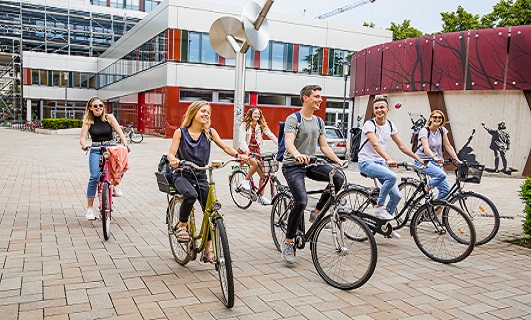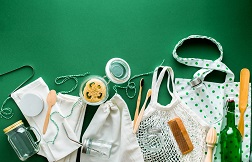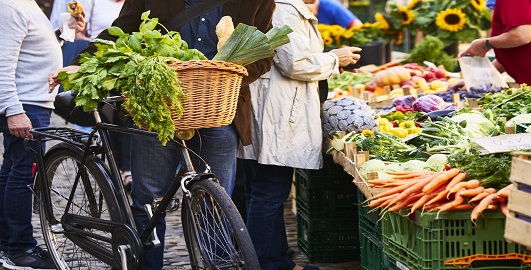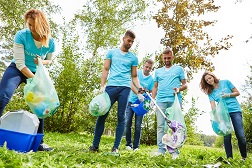Main content
Top content

Sustainable Study
Climate Change affects us all. During your studies, you can contribute to more sustainability and responsible use of resources in the world. By choosing Osnabrück University for your studies or exchange semester, you have already taken a big step in the right direction since both the city and the university are actively committed to the issue of sustainability.
In 2020, the city of Osnabrück was awarded the Nachhaltigkeitspreis (Sustainability Award) for being "Germany's most sustainable major city“. By 2050, Osnabrück intends to have reduced its CO2 emissions by 95% and to generate the majority of its electricity from renewable sources. In addition, more green spaces are being created within the city. In Osnabrück, various initiatives such as "Plastic-free Osnabrück" or "City cycling" aim to promote sustainability and environmental friendliness.
Osnabrück University is also commited to tackling these issues head-on. Regular "TU WAS-campaigns" on the topic of sustainable consumption take place at Osnabrück University, encouraging members of the university to adopt sustainable lifestyles. In addition, every 2 years Osnabrück University publishes an environmental report that highlights the measures taken by the university on the topic of sustainability.
Ultimately, however, it depends on each and every one of us to contribute to a sustainable world. In the following, you can find out how you can make your studies at Osnabrück University as sustainable as possible:
Bicycle
Initiative Studibike (PDF, 76 kB): If you want to travel within Osnabrück, using a bicycle is a good choice. If you don't want to or can't buy your own bike, you can borrow one for a semester from the “Initiative Studibike“. If needed, you can also borrow a bicycle trailer. There is no renting fee, but you have to pay a deposit in advance and have your bike professionally inspected before you return it.
Lastenrudi (PDF, 68 kB): Via Osnabrück University, you can also borrow a cargo bike free of charge for a short period of time (maximum 7 days), which can be used to easily transport larger purchases or furniture.

© SIMONE REUKAUF / Universität Osnabrück
Bike auction: Every year the lost-and-found office auctions off second-hand bicycles at the university. If you are interested, just keep an eye out for the upcoming auction dates in the announcements on Stud.IP or ask the university's environmental coordinator.
Bike flea market: You can find inexpensive, used bikes at almost all bicycle dealers in Osnabrück. You can also look for a bike at one of the regular bike flea markets at the Weidencarrée.
Bicycle pumps: If your bicycle ever has a flat tire, you can easily reinflate it using the air pumps located at various university buildings (e.g. at the main entrance of building 15 or at the entrances of the library at the Westerberg).
AStA workshop: If your bike needs repair but you don't want to take it to a dealer, you can use AStA’s bike repair shop free of charge. After prior registration, you can repair your bike yourself with the help of an expert.
Bus and train
Semesterticket: As a student of Osnabrück University, you can use your semester ticket to travel on all buses in and around Osnabrück free of charge. You can also use it to travel on quite a few train routes around Osnabrück.
Main train station Osnabrück: From Osnabrück's main train station you can travel by train within Germany or Europe. You can even reach some nearby cities, e.g. Hamburg, Bremen or Hanover free of charge with the semester ticket.
Long-distance bus stop: Another (usually inexpensive) way to travel from Osnabrück is by using long-distance coaches. From the long-distance bus stop, which is located right next to the main train station, you can travel to German and European cities with various bus companies.
Cars
Carsharing offered by stadtteilauto: Most places in and around Osnabrück are easy to reach by bike or public transport. However, if you do need a car, car sharing is a good alternative. To register for stadtteilauto, all you need is your Campuscard and a driving license valid in Europe or an official international driving license.
Initiative Studibulli: Following a similar concept, you can also rent a van at low costs through the AStA.
Carpooling: Instead of traveling by bus and train, you can also try to find other people who drive and can give you a ride. The easiest way to find a ride is through carpooling services on the Internet or on the university's bulletin board.

© maramorosz / stock.adobe.com
Waste separation: In Germany, household waste is separated and thrown away in different garbage cans. In addition, there are certain kinds of garbage that you have to drop off at special collection sites. It's best to ask your roommates where the trash belongs or check out this explanation, which you might even want to put up by your trash can.
Deposit system: To reduce single-use plastic waste, Germany maintains a deposit system. When you buy beverages in glass bottles, plastic bottles and cans, you usually pay a small amount as a deposit, which is refunded when you return the empty bottle or can to a store.
kreativMÖBEL (PDF, 134 kB): Many exchange students at Osnabrück University have the opportunity to move into a furnished room in a student dormitory. However, if you are missing any furniture, you may be able to pick up discarded furniture from the university free of charge through “kreativMÖBEL“.
Non-profit stores: Instead of buying expensive new items which you may not be able to take home with you after you’ve finished your studies, you can also buy many things second-hand. At non-profit stores, such as Möwe or DRK Markt, you can buy clothes, furniture, household goods, etc. at a reasonable price and for a good cause.
Exchange Shelves (PDF, 39 kB): Several university buildings feature shelves which you can use to deposit books and other items you don’t need anymore. If you see something of interest, feel free to take it with you! Instead of throwing away a lot of things at the end of your studies or semester abroad, you can leave your things here for another student.
Bulletin Board: On Stud.IP, you can find a bulletin board where you can post your search or sale requests. Among other things, used technology, furniture or bicycles are offered for sale or to give away.
Initiative Papplos: The "Papplos Initiative", which is supported by Osnabrück University and various restaurants and cafés in Osnabrück, aims to reduce the use of disposable cups. If you want to get a coffee or other drink to go, it's best to always bring your own cup and ask if it can be used. Often, you'll even get a small discount if you use your own cup.
Initiative Refill: Buying water in plastic bottles is quite detrimental for the environment and you can easily avoid it by buying a refillable water bottle. In Osnabrück, tap water is of high quality and you can drink it without hesitation. In addition, there are drinking water fountains in various places in Osnabrück where you can fill up your bottles for free. At the university, these are located in buildings 15 (EW), 96 (UB), 94 and the Westerberg and Innenstadt cafeterias.

© upixa - stock.adobe.com / Universität Osnabrück
Grocery shopping: In almost all supermarkets in Germany, you can find groceries that have been produced organically, regionally and/or in a fair way. You can distinguish these products with the help of specific labels and symbols. If you want to pay attention to sustainability when shopping, it is also a good idea to visit one of the various organic supermarkets, the non-packaging store Tara Unverpackt, one of the farm stores or a weekly market.
University Cafeterias: The topic of sustainability is also a priority in the university cafeterias. There is a special climate plate, many products are organic, fair and/or regional, and food waste is avoided as far as possible.
Too Good To Go: With this app, you can find local vendors who offer leftover food at discounted prices. Most of the time, you can simply reserve them online and pick them up shortly before closing time.
If you want to actively contribute to more sustainability, there are various projects and associations in Osnabrück that you can support.

© Robert Kneschke - stock.adobe.com / Universität Osnabrück
CO2-Footprint calculator: You can use a footprint calculator to find out how much CO2 you are emitting. This will tell you how sustainable and environmentally-friendly you live and whether you could still improve certain things and behaviours.
STADTRADELN: In this annual competition, the goal for every participant is to make as many climate-friendly trips as possible by bicycle over a period of 21 days. The campaign aims to encourage people to cycle more often and highlights that cycling can reduce CO2-emissions.
Fridays for Future: Osnabrück is home to an active Fridays for Future group.
Projekt Foodsharing: With the help of the so-called "Fair-teiler", in which you can exchange unused food, the project tries to contribute to the fight against food waste. After registering and participating in an information event, you can join “Projekt Foodsharing“.




